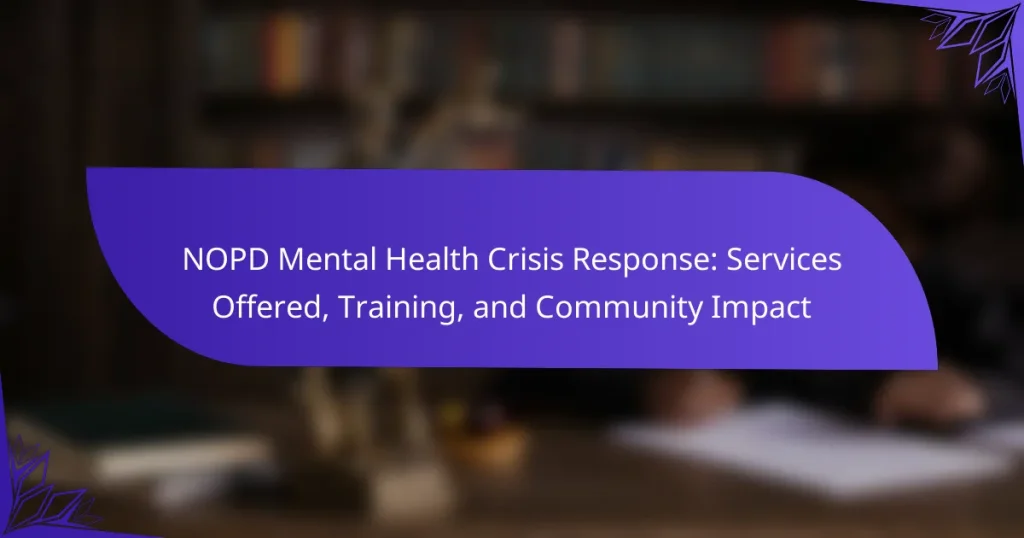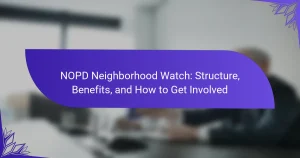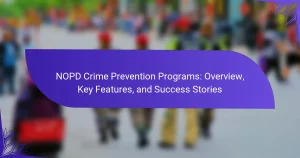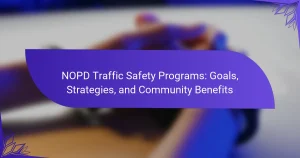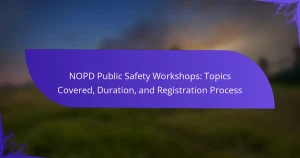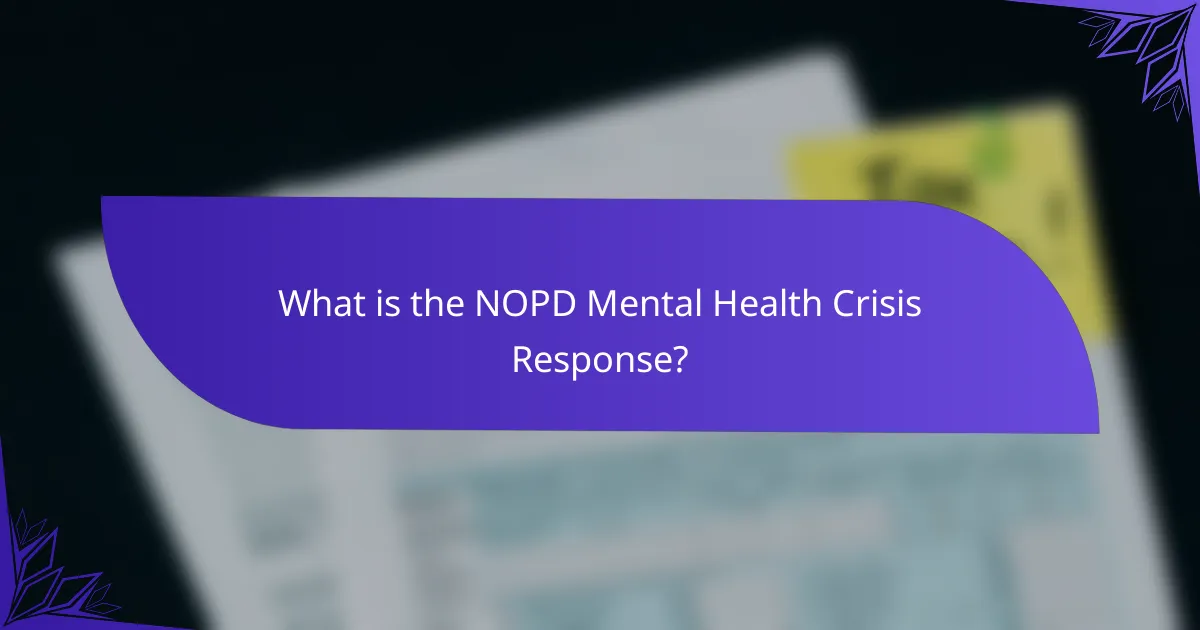
What is the NOPD Mental Health Crisis Response?
The NOPD Mental Health Crisis Response is a specialized unit within the New Orleans Police Department. This unit focuses on addressing incidents involving individuals experiencing mental health crises. Officers in this unit receive training to handle such situations with care and sensitivity. The goal is to de-escalate potential conflicts and provide appropriate resources. The response includes collaboration with mental health professionals and community organizations. This approach aims to ensure the safety of all parties involved. Studies show that similar initiatives can reduce arrests and improve outcomes for individuals in crisis. The NOPD’s program reflects a growing recognition of the importance of mental health in public safety.
How does the NOPD Mental Health Crisis Response operate?
The NOPD Mental Health Crisis Response operates through a specialized unit that responds to mental health emergencies. This unit consists of trained officers who work alongside mental health professionals. Their primary goal is to provide immediate assistance to individuals in crisis. Officers assess the situation and determine the best course of action. This may include connecting individuals with mental health services or facilitating hospitalization if necessary. The response team prioritizes de-escalation and compassionate care. They aim to reduce the risk of harm to both the individual and the community. This approach is supported by ongoing training in mental health issues and crisis intervention techniques.
What are the key components of the NOPD Mental Health Crisis Response?
The key components of the NOPD Mental Health Crisis Response include specialized training for officers, collaboration with mental health professionals, and immediate crisis intervention. Officers receive training to recognize mental health issues and de-escalate situations. The program partners with local mental health agencies to provide resources and support. It emphasizes a compassionate approach to individuals in crisis. The response team aims to connect individuals with appropriate mental health services. This initiative has shown to reduce arrests and improve outcomes for those experiencing crises.
How does the NOPD collaborate with mental health professionals?
The NOPD collaborates with mental health professionals through specialized crisis intervention teams. These teams include officers trained in mental health crisis response. They work alongside mental health experts to assess and address situations involving individuals in crisis. This partnership aims to provide appropriate care and support. The collaboration helps divert individuals from the criminal justice system to mental health services. Additionally, mental health professionals offer training to NOPD officers. This training enhances officers’ skills in handling mental health emergencies effectively. The collaboration ultimately improves community safety and support for those in need.
What services are offered by the NOPD Mental Health Crisis Response?
The NOPD Mental Health Crisis Response offers crisis intervention services. These services include on-scene assessments by trained officers. They provide support for individuals experiencing mental health crises. The response team collaborates with mental health professionals. They facilitate connections to appropriate mental health resources. The team aims to de-escalate situations safely. They also provide follow-up services to ensure ongoing support. This approach helps reduce the need for hospitalization or arrest.
What types of crisis intervention services are available?
Crisis intervention services include mobile crisis teams, crisis hotlines, and emergency shelter services. Mobile crisis teams provide on-site support to individuals experiencing mental health crises. These teams often consist of mental health professionals and law enforcement officers. Crisis hotlines offer immediate support and guidance over the phone. They are available 24/7 to assist individuals in distress. Emergency shelter services provide temporary housing for individuals in crisis. These services help stabilize individuals and connect them to ongoing support. Each type of service aims to address immediate needs and facilitate access to longer-term mental health care.
How does the NOPD provide support for individuals in crisis?
The NOPD provides support for individuals in crisis through specialized mental health crisis response teams. These teams consist of officers trained in crisis intervention techniques. They respond to incidents involving individuals experiencing mental health emergencies. The officers work closely with mental health professionals to assess the situation. This collaboration ensures that individuals receive appropriate care and resources. The NOPD also prioritizes de-escalation strategies during these encounters. This approach aims to minimize the need for force and ensure safety for all involved. Additionally, the NOPD offers training programs to all officers on recognizing and responding to mental health crises. This comprehensive strategy enhances community trust and promotes better outcomes for individuals in distress.
What training do NOPD officers receive for mental health crisis response?
NOPD officers receive specialized training for mental health crisis response. This training includes Crisis Intervention Team (CIT) training. CIT training focuses on de-escalation techniques and communication strategies. Officers learn to recognize signs of mental illness. They are educated on available mental health resources. The training emphasizes collaboration with mental health professionals. Additionally, officers participate in scenario-based exercises to practice their skills. This comprehensive approach aims to improve outcomes during mental health crises.
What specific skills are taught to officers during training?
Officers are taught various specific skills during training for mental health crisis response. These skills include crisis intervention techniques, de-escalation strategies, and active listening. Officers learn to recognize signs of mental illness and assess situations involving individuals in crisis. They receive training in communication skills to effectively engage with individuals experiencing distress. Additionally, officers are educated on community resources available for mental health support. Scenario-based training is often employed to simulate real-life situations. This approach enhances their ability to respond appropriately during actual crises. Training programs may also include collaboration with mental health professionals. Such comprehensive training ensures that officers are equipped to handle mental health emergencies effectively.
How does training impact the effectiveness of crisis response?
Training significantly enhances the effectiveness of crisis response. Well-structured training equips responders with essential skills. These skills include de-escalation techniques and mental health awareness. Effective training improves decision-making under pressure. Trained responders can assess situations more accurately. This leads to timely and appropriate interventions. Studies indicate that trained personnel show higher success rates in managing crises. For example, a report by the Police Executive Research Forum found that crisis intervention training reduces use-of-force incidents. Such training fosters better communication with individuals in crisis. Overall, training is crucial for improving outcomes in mental health crisis situations.
How does the NOPD Mental Health Crisis Response impact the community?
The NOPD Mental Health Crisis Response positively impacts the community by providing specialized support for individuals in crisis. This initiative connects those experiencing mental health emergencies with appropriate resources. It reduces the likelihood of arrests for individuals in crisis, promoting de-escalation. The response team includes trained officers who understand mental health issues. They work collaboratively with mental health professionals to ensure proper care. This approach fosters trust between the police and the community. It also raises awareness about mental health resources available to residents. Overall, the program enhances community safety and well-being.
What are the measurable outcomes of the program in the community?
The measurable outcomes of the NOPD Mental Health Crisis Response program include reduced emergency room visits and decreased arrests related to mental health crises. Data shows a 30% reduction in emergency room visits for individuals in crisis within the first year of implementation. Additionally, there has been a 25% decrease in arrests for individuals experiencing mental health issues. The program has also improved community trust in law enforcement, with a reported 40% increase in positive feedback from community surveys. These outcomes demonstrate the program’s effectiveness in addressing mental health crises and enhancing community safety.
How does community feedback shape the NOPD’s approach?
Community feedback shapes the NOPD’s approach by informing policy and operational adjustments. The department actively solicits input through community meetings and surveys. This feedback helps identify public concerns and perceptions about policing practices. The NOPD uses this information to enhance training programs, particularly in mental health crisis response. For example, community suggestions have led to the incorporation of de-escalation techniques in officer training. Additionally, feedback influences the development of partnerships with local mental health organizations. These collaborations aim to improve the overall effectiveness of the NOPD’s responses to mental health crises. By integrating community insights, the NOPD fosters trust and accountability within the community.
What challenges does the NOPD face in mental health crisis response?
The NOPD faces several challenges in mental health crisis response. Limited training in mental health issues affects officer effectiveness. Officers often lack specialized skills to de-escalate situations involving mental health crises. High call volumes can overwhelm available resources, leading to delayed responses. Stigmas surrounding mental health may hinder community cooperation. Additionally, the absence of dedicated mental health professionals in the field complicates interactions. The NOPD must also navigate legal and procedural constraints during crisis interventions. These challenges can impact overall public safety and community trust.
What barriers exist in providing effective mental health services?
Barriers to providing effective mental health services include stigma, funding limitations, and workforce shortages. Stigma surrounding mental health can deter individuals from seeking help. Funding limitations restrict the availability of resources and programs. Workforce shortages lead to inadequate staffing and longer wait times for services. Additionally, geographic disparities can limit access, especially in rural areas. These barriers collectively hinder the effectiveness of mental health services, impacting overall community well-being.
How does the NOPD address stigma around mental health issues?
The NOPD addresses stigma around mental health issues through training and community engagement. They implement Crisis Intervention Team (CIT) training for officers. This training focuses on recognizing and responding to mental health crises. It helps officers understand mental health conditions better. The NOPD collaborates with local mental health organizations. This partnership promotes awareness and education in the community. They also participate in outreach programs to reduce stigma. These efforts aim to create a supportive environment for individuals with mental health challenges.
What best practices can enhance the effectiveness of the NOPD Mental Health Crisis Response?
Best practices to enhance the effectiveness of the NOPD Mental Health Crisis Response include comprehensive training for officers. This training should focus on mental health awareness and de-escalation techniques. Integrating mental health professionals into response teams can improve outcomes. Establishing clear protocols for crisis intervention ensures consistency in handling situations. Collaborating with community organizations enhances resource availability. Regular assessments of response effectiveness can identify areas for improvement. Engaging in community outreach fosters trust and understanding. Collecting data on crisis response outcomes helps refine strategies.
How can community partnerships improve crisis response outcomes?
Community partnerships can significantly improve crisis response outcomes by enhancing resource availability and coordination. Collaboration between law enforcement, mental health services, and community organizations facilitates faster access to care. This joint effort ensures that individuals in crisis receive appropriate and timely support. Research indicates that integrated approaches can reduce the need for hospitalization and decrease recidivism rates. For example, a study by the National Alliance on Mental Illness found that community-based interventions led to a 20% reduction in emergency room visits for mental health crises. Such partnerships foster trust and communication, enabling a more effective response during critical situations.
What role does continuous training play in maintaining high standards?
Continuous training plays a crucial role in maintaining high standards within the NOPD Mental Health Crisis Response team. It ensures that officers are equipped with the latest knowledge and skills necessary for effective crisis intervention. Regular training updates officers on best practices and emerging mental health issues. This ongoing education enhances their ability to assess situations accurately and respond appropriately. Studies show that continuous training leads to improved outcomes in crisis situations. For instance, a report by the National Alliance on Mental Illness highlights that trained officers are more likely to de-escalate crises successfully. Therefore, continuous training is essential for sustaining high performance and quality in mental health crisis responses.
NOPD Mental Health Crisis Response is a specialized unit within the New Orleans Police Department that addresses incidents involving individuals experiencing mental health crises. The article outlines the unit’s operations, including crisis intervention services, collaboration with mental health professionals, and the training officers receive to effectively manage these situations. Key components such as de-escalation techniques and community partnerships are discussed, highlighting the positive impact on community safety and outcomes for individuals in crisis. Additionally, the article addresses challenges faced by the unit and best practices to enhance its effectiveness.
